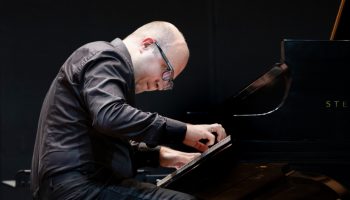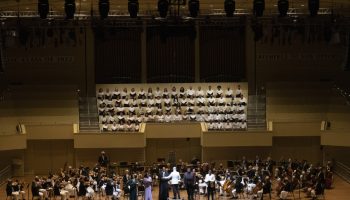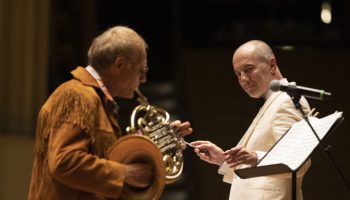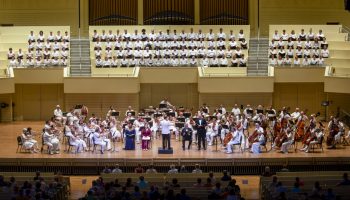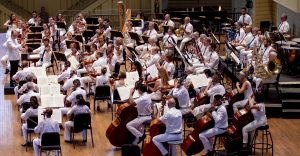
Two of Chautauqua’s own will take a moment to shine tonight as guest conductor and soloist.
The Chautauqua Symphony Orchestra — featuring CSO Associate Concertmaster Vahn Armstrong and Music School Festival Orchestra Conductor Timothy Muffitt — will perform at 8:15 p.m. Tuesday, August 13 in the Amphitheater. The program features two Romantic-era pieces: Max Bruch’s Violin Concerto No. 1 in G Minor, Op. 26, and Antonín Dvořák’s Symphony No. 7 in D Minor, Op. 70.
Bruch’s Violin Concerto No. 1 is a central part of the violin’s repertoire. To Muffitt, the piece’s reputation is well-deserved.
“It’s extraordinarily beautiful, not only in the way the violin is used but in the interaction between it and the orchestra,” Muffitt said. “It really makes this stand out as one of the great Romantic-era violin concertos.”
Muffitt, who is also the music director and conductor of both the Baton Rouge Symphony Orchestra and the Lansing Symphony, said Armstrong is well-suited for the concerto’s solo part.
“(Armstrong) is a wonderful violinist, and he has a longstanding relationship with the other players,” Muffitt said. “It’s always exciting to have one of our own out there in the soloist position.”
Armstrong has served as the associate concertmaster of the CSO for 27 seasons. He said the Bruch concerto embodies the violin’s most famous qualities.
“This particular concerto is a favorite for violinists,” Armstrong said. “It’s got a lot of technical aspects that are fun to play, and it celebrates an aspect of the violin — that romantic singing quality. For many of us, that’s why we decided to play the violin in the first place.”
For Armstrong, the concerto is more than just a favorite — it was what pushed him to pursue a musical career.
“Anyone who’s learning to play an instrument goes through a period of time in which they wonder if they want to get really serious about it,” Armstrong said.
During this time, Armstrong attended a concert at Michigan State University. The university hosted the Chicago Symphony Orchestra and violinist Pinchas Zukerman to perform Bruch’s Violin Concerto No. 1 in what Armstrong described as “essentially an old basketball gym.”
But in this old gym, Armstrong said, he heard Zukerman play and came to a decision.
“I was sold,” Armstrong said. “It was that concert that decided it for me. I said, ‘I really like this violin business; it’s time to get serious about it.’ … Somehow, they managed to put on this concert in a gym that changed my life.”
The experience stuck with him. To this day, he has a unique perspective on unusual venues, Armstrong said.
“Sometimes, as a performing violinist, I play in places that I don’t particularly enjoy,” he said. “But then I remember: Who knows who’s out there in the audience, and what effect this concert might have on them?”
Armstrong performs as a concerto soloist a few times per year. He said the soloist’s role is high-profile and important — and fun.
“Any time you play a concerto, the attention is on you,” Armstrong said. “You need to carry that. But it’s a fun thing to do, taking a moment to shine.”
The concert will also include Dvořák’s Symphony No. 7. Dvořák, a Czech composer, wrote the piece in 1885, while his country struggled to define itself politically and culturally. After finishing the movement, he wrote to a friend that he hoped the uniquely Czech symphony would create an international stir.
“Now I am occupied with my new symphony (for London), and wherever I go I have nothing else in mind but my work, which must be such again as to make a stir in the world, and God grant that it may!” Dvořák wrote.
Dvořák created a symphony that, according to Muffitt, showed a new emotional range for the composer.
“The Seventh Symphony really stands out in Dvořák’s symphonic repertoire for its expressive scope,” Muffitt said. “It’s at a level of drama and intensity that the other symphonies — though wonderful — don’t go into that realm.”
Muffitt said Dvořák drew influence from many other popular composers of his day, but created unique work.
“We hear him as the composer, as the driving force — it’s not a derivative work; he was just absorbing a lot of what was around him and filtering it through his spirit,” Muffitt said.
To Armstrong, the two Romantic pieces will complement each other in the CSO’s performance.
“I think the orchestra has sounded fantastic this year; they’re playing with a beautiful sound and a beautiful ensemble — but also with a lot of heart and passion,” Armstrong said. “The Bruch violin concerto is the height of Romantic lyricism, and you have to put the Dvořák in the same category — just tuneful, joyous music.”

